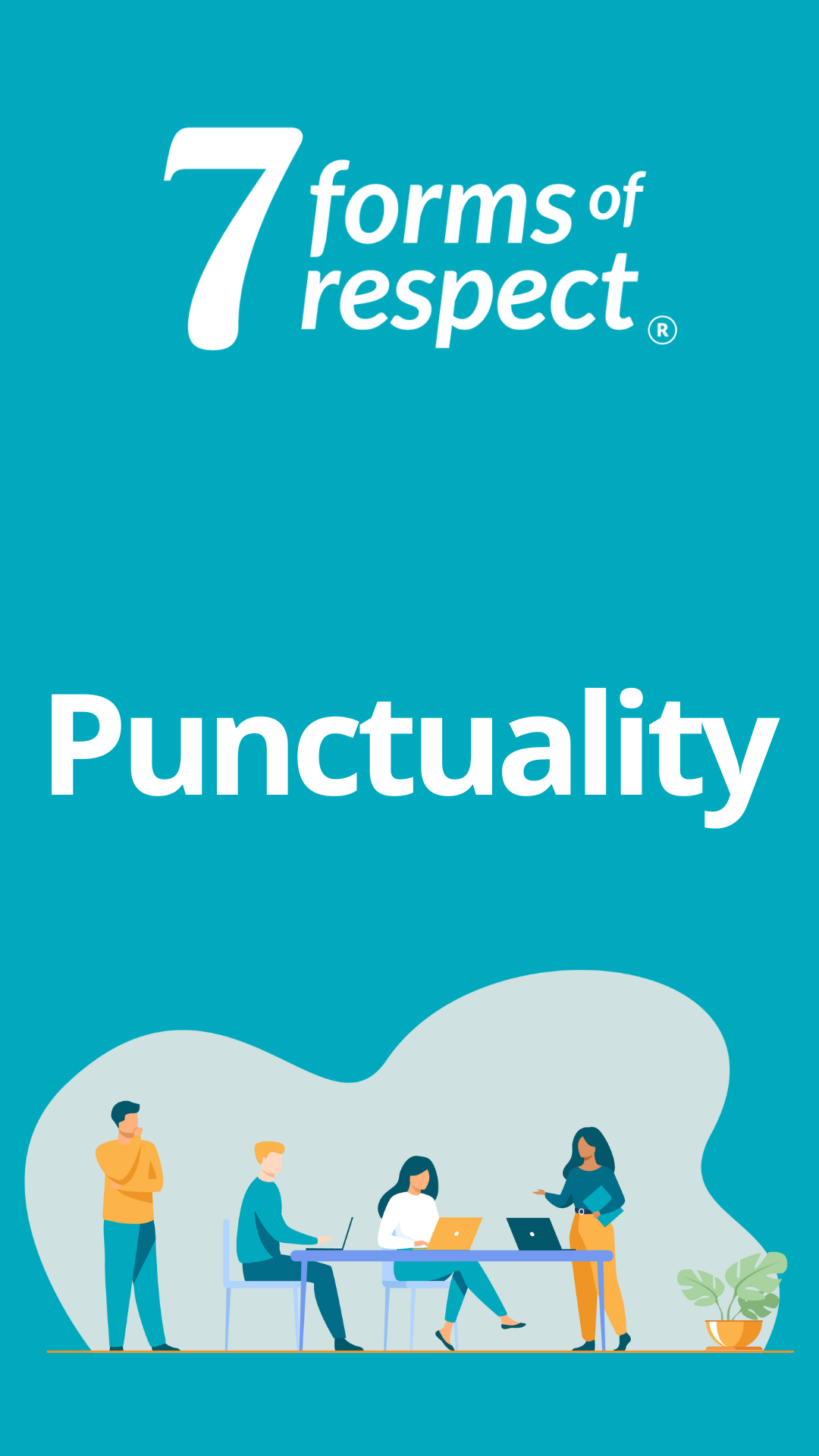
Welcome to the 7 Forms of Respect (FoR)® Over the next few months, we’ll introduce you to these concepts and give examples of how to apply them to your life to learn more about which forms of respect you like to “give” and which ones you like to “get”. The 7 FoR tool provides a vocabulary to describe what matters to you and to others. Inturn, it builds mutual understanding and trust. Respect is relative. What is important to you might not be important to someone else. The 7 FoR is a framework to describe the different forms of respect.
In this post, we will be going in-depth on “Procedure” as a form of respect. The others include: punctuality, information, candor, consideration, acknowledgement and attention. Procedure as a form of respect is about adherence to and making of rules, clearly stated expectations, and protocol.
How Procedure shows up in everyday life
Imagine you were invited to speak at an event. After the event, a long line forms of audience members who want to speak with you privately. As the line winds down, acquaintances you know start to exit the room and they come by to say goodbye. Do you put those in the line on hold so you can thank and have a brief conversation with those acquaintances who came to your talk? Or do you wave goodbye to your acquaintance and continue to talk with those who have been waiting in the line?
If you chose to talk to the acquaintances, you gave them respect in the form of Acknowledgement, at the expense of the audience members who were waiting in line.
If you chose to focus on those who are waiting in line, you gave them respect in the form of Procedure by addressing them first since they followed the norms.
Years ago, I was waiting in that line for my turn. The speaker chose to respect his acquaintances. Looking back, I am sure he did not mean to disrespect the audience members waiting in the line. Perhaps other people in the line did not feel disrespected in the way that I did because they don’t place such a high value on Procedure. Because I do, especially from those who have more power than me, I felt disrespected because he was letting people “cut the line.” He chose not to adhere to Procedure.
This demonstrates how forms of respect are subtle and present in everyday life.
Procedure can look like:
- Clear expectations of how something needs to be done
- Detailed written rules and guidelines
- Honorifics, titles, and salutations to address people
- Focus on the process
Lack of Procedure as a form of respect looks like:
- No or vague expectations of how something needs to be done
- No or little or vague written rules and guidelines
- Lack of use of honorifics, titles
- Focus on the outcome or the relationships
How Procedure can be interpreted differently
There are many different personal and professional reasons for why someone would care about giving and/or getting Procedure as a form of respect. Understanding your forms of respect starts with asking yourself: why does this matter to me? Many people in our research talked about their families and childhood. Others focused on the demands of their current job function and meeting expectations.
FoR provides a shared language to describe what you need. You’ll be able to use this language to navigate conflict and address misunderstanding. This can come up when you want a particular FoR of respect and you aren’t getting it. You can then share why the FoR matters to you.
Scenario 1:
Kim and Mike are peers on the same team. Kim asked Mike to help her on a project and she sent him instructions on how to do the work. Mike gets his part done on time. Kim is upset. Mike is unsure why. It turns out Mike didn’t read her instructions and missed a few steps, so the finished project isn’t as she wanted. Kim tells Mike, “I really care about getting Procedure from my peers because it makes me feel like you care enough to read what I took the time to write. Also, many of these instructions are built on my previous experience. When you don’t follow the instructions, you’re not acknowledging my experience and expertise on the topic. I’ve had previous coworkers who underestimate my abilities and didn’t read my instructions.” Kim doesn’t just tell Mike what she needs, she also tells him what past experiences have shaped this need. Mike now understands. Otherwise, he might think Kim is just being too rigid.
Scenario 2:
Eric always gives precise instructions and reminders on how and when to do things. It makes Ann, his direct report, feel like he doesn’t trust her to do her job. Finally she tells him, “I feel like you tell me what to do all the time. It reminds me of my parents talking to me like I’m a child.” Eric is surprised. He tells her, “I give Procedure as a form of respect because I grew up with parents who spoke limited English and I translated for them. I also had to manage their appointments and schedules. Taking the time to do that for them was a form of respect because I didn’t assume they would understand the English.” Learning that, Ann could understand why Eric did what he did and Eric tried to give Ann less Procedure once he learned it makes her feel like a child.
Our preference for certain Forms of Respect are rooted in our past experiences. Explaining those experiences builds empathy with others. Whenever you work with someone who doesn’t share your same forms of respect, you can use FoR to talk about it. Ask them about their past experiences, who influenced them, and why adhering to the rules is personally important.
Procedure is a form of respect focused on rules, protocol, clear expectations and structure. If you don’t care about Procedure as a form of respect, it doesn’t mean you’re disrespectful. It just means you don’t place as much value or emphasis on following rules, protocol, clear expectations, and structure.
What’s Next
Check out Dr. Julie Pham’s book, 7 Forms of Respect: A Guide to Transforming Your Communication and Relationships at Work.
To learn more about the 7 Forms of Respect, you can also sign up for a workshop and get access to our full 7 Forms of Respect Assessment. CuriosityBased is also available to consult with your company or team about applying the 7 Forms of Respect to improve communication, collaboration, and trust.
Is Procedure a form of respect for you?
Take the free quiz here.








Leave a Reply